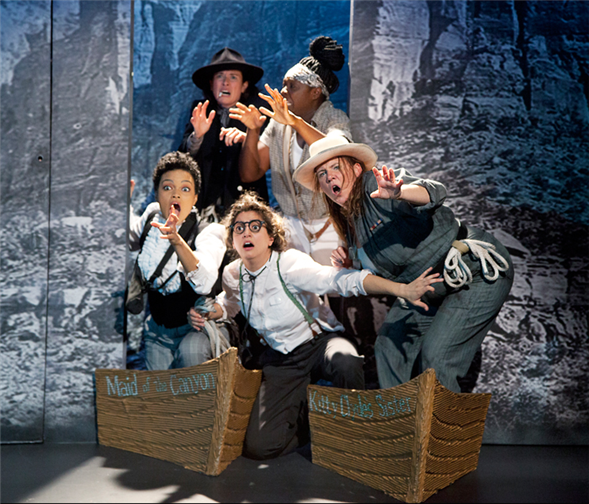Translate Page

Why Men On Boats isn't a realistic play
---
There are no boats in Men on Boats. Sure, there are suggestions of boats – small, boat-ish props that the actors hold as they simulate a journey through the Green and Colorado Rivers. But even while they're "floating," we see the performers' legs planted firmly on the floor.
Things get even less naturalistic when the characters in Jaclyn Backhaus's play, now at Playwrights Horizons in a co-production with Clubbed Thumb, run into terrifying rapids. Instead of cascading water or ominous riverbanks, we're treated to the actors talking about the treacherous currents as they scurry around the stage.
But here's the thing: As they hurl themselves through the room, bodies tightly choreographed and voices rising and falling, the actors create a visceral impression of being pummeled by water and clinging to their flimsy skiffs. This may not be "realistic," but it feels absolutely real.
That spirit echoes through the show. The plot, for instance, is inspired by the Powell Geographic Expedition of 1869, when an American naturalist named John Powell led white men into the Grand Canyon for the first time. Yet in this production, all the men are played by women. They also use contemporary slang and generally behave like modern Americans.
Again, though, the play seems intellectually honest. In fact, you could argue that because she dispenses with period details, Backhaus can delve more deeply into timeless themes about American identity.
"I purposefully made this show impossible to do in a realistic sense," she says. "I was really craving the ability to set the audience up with this entire language – both visually and textually – that gives you the option to just go with us."
{Image1}
Director Will Davis, who also helmed the show when it premiered at Clubbed Thumb last year, is focused on making that language clear.
"It's a director's job to look at the page and say, 'What's the virtuosic thing that's being done?'" he says. "When I was reading the way [Jaclyn] had written these rapids, with folks in their boats going over waterfalls, I saw so clearly that the virtuosity for me was how the language and the rhythm make the river. The way they're speaking to each other, and the words they're using, and the lack of repetition – those are the rapids. So it's my job to get that lifted up, to frame it in such a way that the words can make you feel where you are, in that rough magic of the theatre. If I were to just literally stage it, it would be a bad show."
Of course, the abstract style does more than create conceptual moments. It also guides Backhaus's approach to the facts. Take a scene where one of Powell's men leaves the expedition. He's delivered to a pair of Ute tribesmen, who give him supplies and help him get home. This actually happened, and Backhaus wanted to dramatize the strangeness of the encounter. That's why the Ute characters use a distinct type of slang and stand very, very still, unlike the fidgety white men.
"When I was reading Powell's journals, it was so surprising that they were able to get out of that series of canyons and just drop [their companion] off," she says. "And the Utes – who they did actually meet – saw no reason for these people to go through this exploration. They thought that was crazy. So I think of their stillness and their language as giving us a serious 'point of view' about these travelers."
It's clear the Utes think the explorers are out of their minds, which is why the scene is so funny. To strengthen their point of view, Davis focused on their stillness, telling the actors playing the Utes not even to move their hands. "Stillness always means you're more in charge," he says. "If other people are squirming, and you're still, then you're in charge. That's just how politics work on stage."
He appreciates how scenes like this reflect both the factual history of Powell's journey and the dramatic stakes of the show. As he says, "That's where theatre is at its best, in the crosshairs between sharing a realistic sense of a story and also lifting it up to a sense of theatrical abstraction. It brings home the feeling of what's happening on a much deeper level."
---
Follow Mark Blankenship at @IAmBlankenship. Follow TDF at @TDFNYC.
Photos by Elke Young. Top photo: The cast of Men on Boats.
TDF members: Go here to browse our current discounts for theatre, dance, and concerts.